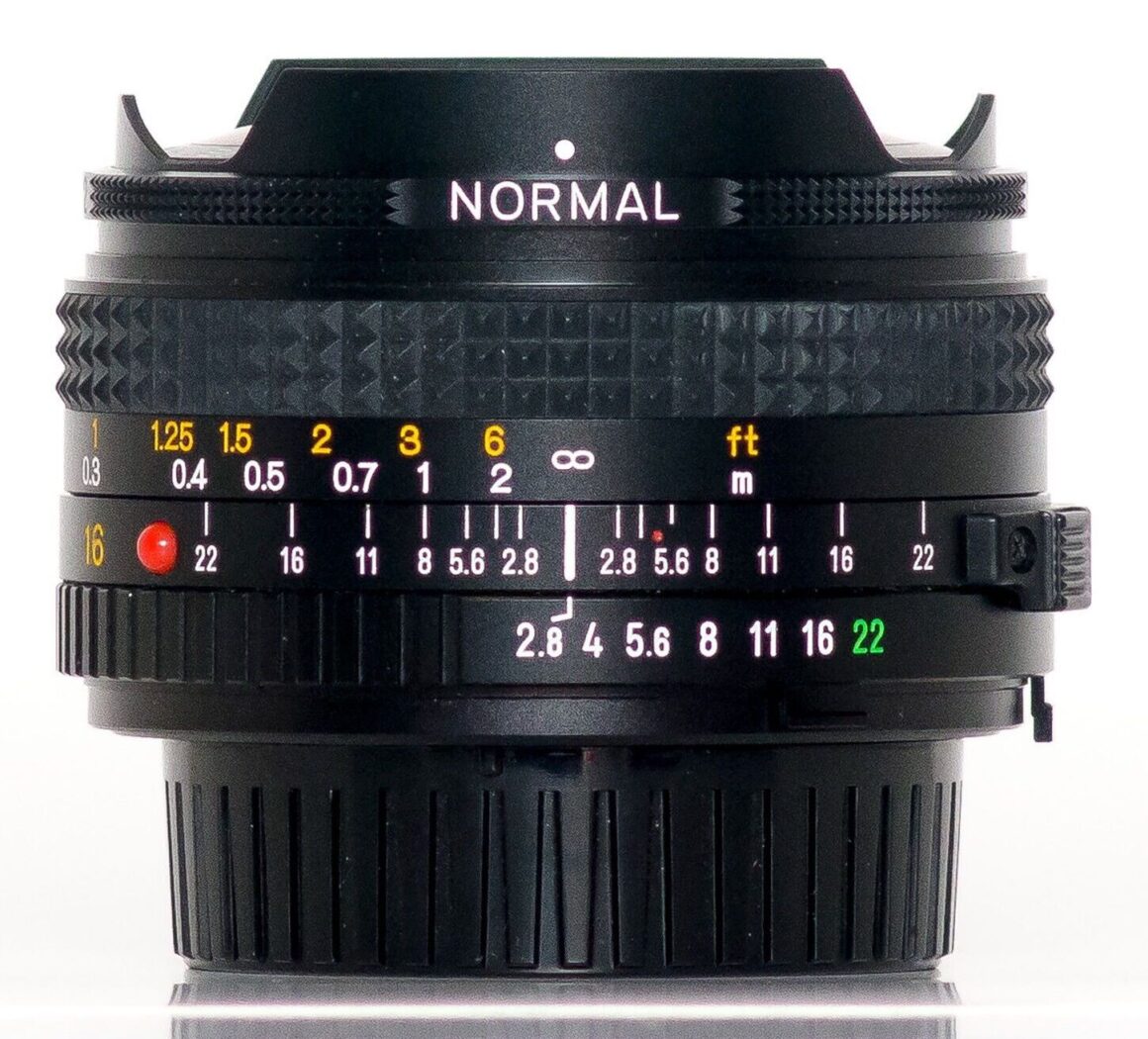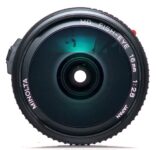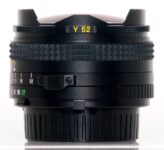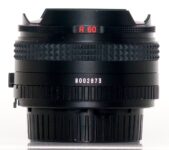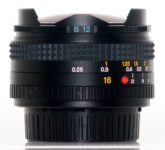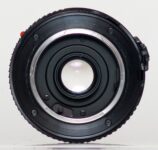Minolta MD 16mm F/2.8 Fisheye
Fisheye lens • Film era • Discontinued
- Announced:
- · October 1981
- Production status:
- ● Discontinued
- Country of design:
- · Japan
- Original name:
- · MINOLTA MD FISH-EYE 16mm 1:2.8
- Class:
- · Fast full-frame diagonal fisheye lens
- System:
- · Minolta SR (1958)
Abbreviations
| MD | The lens is coupled to the camera's TTL exposure meter for full-aperture measurement. In addition to aperture-priority auto exposure mode, the lens also supports shutter-priority auto exposure mode. |
| FISHEYE | An ultra-wide angle lens with strong uncorrected barrel distortion and extreme angle of view. |
Model history (5)
| ■Minolta MC Rokkor-OK 16mm F/2.8 Fisheye | A | 11 - 8 | 0.30m | -- | 1969 ● | |
| ■Minolta MC Rokkor[-OK] 16mm F/2.8 Fisheye Gen. X | A | 11 - 8 | 0.30m | -- | 1973 ● | |
| ■Minolta MD Rokkor 16mm F/2.8 Fisheye | A | 11 - 8 | 0.30m | -- | 1977 ● | |
| ■Minolta MD Rokkor 16mm F/2.8 Fisheye | A | 10 - 7 | 0.25m | -- | 1980 ● | |
| ■Minolta MD 16mm F/2.8 Fisheye | A | 10 - 7 | 0.25m | -- | 1981 ● | |
Specification
| Optical design: | |
| 35mm full frame | |
| 16mm | |
| F/2.8 | |
| 10 elements in 7 groups | |
| Diagonal (full-frame) fisheye | |
| Minolta SR [43.5mm] | |
| 180° | |
| Diaphragm mechanism: | |
Diaphragm type: | Automatic |
Aperture control: | Aperture ring (Manual settings + Auto Exposure setting) |
| 6 (six) | |
| Focusing: | |
| 0.25m | |
| <No data> | |
Focusing modes: | Manual focus only |
Manual focus control: | Focusing ring |
| Physical characteristics: | |
| 265g | |
| ⌀64.5×43mm | |
| Accessories: | |
| Removable front filters are not accepted | |
| Built-in Normal, Y52, B12, R60 (part of the lens optical system) | |
| Built-in petal-shaped | |
| Minolta MD 2X Tele Converter 300-S → 32mm F/5.6 |
Sources of data
- A guide to the Minolta SLR system of creative photography 0209-F1.
- A guide to the Minolta SLR system of creative photography 0411-K7 (1984).
Typical characteristics of fisheye lenses
- Extreme angle of view (at least 180° diagonally);
- Circular types (the image circle of the lens is inscribed in the image frame) or diagonal types (cover the entire image frame);
- Usually of equidistant projection type, with the distance from the picture center to any given point always proportional to the angle from the optical axis to that point;
- Huge barrel distortion;
- Short closest focusing distance (0.20 - 0.30m with 35mm full-frame prime lenses);
- Very large depth of field, eliminating the need for autofocus or precise manual focusing;
- Due to the extreme angle of view and convex front element, front filters cannot be used;
- Often equipped with a filter turret with swivel-mounted filters;
- Often come with a small, built-in petal-shaped lens hood.
Other fisheye lenses in the Minolta SR system
| ■Minolta SR mount (8) | |||||||||
| Minolta MC Rokkor 7.5mm F/4 Fisheye Gen. X | A | 12 - 8 | 1.20m | -- | 1975 ● | ||||
| Minolta MD Rokkor 7.5mm F/4 Fisheye | A | 12 - 8 | 1.20m | -- | 1977 ● | ||||
| Minolta MD 7.5mm F/4 Fisheye | A | 12 - 8 | -- | 1982 ● | |||||
| Minolta MC Rokkor-OK 16mm F/2.8 Fisheye | A | 11 - 8 | 0.30m | -- | 1969 ● | ||||
| Minolta MC Rokkor[-OK] 16mm F/2.8 Fisheye Gen. X | A | 11 - 8 | 0.30m | -- | 1973 ● | ||||
| Minolta MD Rokkor 16mm F/2.8 Fisheye | A | 11 - 8 | 0.30m | -- | 1977 ● | ||||
| Minolta MD Rokkor 16mm F/2.8 Fisheye | A | 10 - 7 | 0.25m | -- | 1980 ● | ||||
| Minolta UW Rokkor-PG 18mm F/9.5 Fisheye | P | 7 - 5 | -- | 1966 ● | |||||
Lenses with similar focal length
| ■Minolta SR mount (3) | |||||||||
| Sigma MF 15mm F/2.8 Fisheye Multi-Coated ZEN | A | 8 - 7 | 0.15m | -- | 1990 ● | ||||
| Sigma MF 16mm F/2.8 Filtermatic Fisheye Multi-Coated | A | 9 - 8 | 0.15m | -- | 1980 ● | ||||
| Sigma[-XQ] MF 16mm F/2.8 Filtermatic Fisheye Multi-Coated | A | 11 - 9 | 0.15m | -- | 1978 ● | ||||
| ■Interchangeable mount (2) | |||||||||
| Sigma[-XQ] MF 16mm F/2.8 Filtermatic Fisheye Multi-Coated [YS] | A | 11 - 8 | 0.15m | -- | 1973 ● | ||||
| BelOMO Peleng A 17mm F/2.8 Fisheye MC [T] akaБелОМО ПЕЛЕНГ А 17mm F/2.8 МС РЫБИЙ ГЛАЗ | P | ? - ? | 0.30m | -- | ● | ||||
